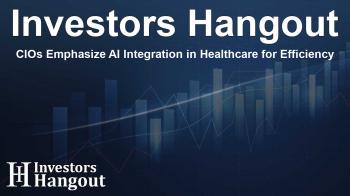CIOs Emphasize AI Integration in Healthcare for Efficiency

Survey Highlights CIOs’ Focus on AI for Administrative Efficiency
Health IT leaders are recognizing the significant potential of artificial intelligence (AI) in transforming the administrative landscape of healthcare. Recent findings show that more than 80 percent of surveyed Chief Information Officers (CIOs) view automation with AI as a crucial strategy, although only about half have implemented such solutions. This survey reflects evolving priorities as healthcare leaders increasingly value AI's role in easing administrative burdens for providers and support staff.
Priorities for AI Implementation in Healthcare IT
A substantial majority, specifically 81% of CIOs, consider automating administrative tasks as a major focus in their AI integration strategy. Following this, enhancing clinical decision support emerged as a priority for 70% of respondents, while 59% emphasized the need for improved revenue cycle management and financial processes.
Embedding AI within EHR Systems
Interestingly, nearly half of the CIOs surveyed (48%) believe it is critical for AI functions to be seamlessly integrated within Electronic Health Records (EHR). According to Kem Graham, Vice President of Growth and Strategy at CliniComp, "The results highlight a clear intent among hospital and health system CIOs to incorporate AI tools effectively; however, there remains some uncertainty regarding the best methods for integration into existing systems."
Importance of AI-Driven Interoperability
The survey revealed that about one-third (32%) of CIOs consider AI-driven interoperability essential for enhancing data exchange and facilitating care coordination, while the rest see it as somewhat important. This consensus indicates an understanding of AI's potential to significantly improve processes within healthcare settings.
Challenges and Opportunities in AI Integration
Despite the enthusiasm for AI technologies, the path to optimal implementation remains challenging. Previous surveys highlight that only a small fraction of IT leaders in medium to large healthcare organizations feel their AI capabilities are fully developed. Notably, the current CHIME Foundation survey also mentions that 52% of CIOs are actively using AI solutions while 48% are in the stages of evaluating future options.
Key Areas Where AI Can Make an Impact
CIOs expressed various pressing challenges where they believe AI can provide solutions. Specifically, 54% pointed to the burdens of documentation, indicating a need for AI technologies that support ambient listening and automated notes. In addition, 15% identified the potential for AI to optimize revenue cycle management through improved claims processing. Other areas of interest include predictive analytics for clinical decision support, improving patient scheduling, and managing bed occupancy.
The Future of AI in Healthcare
As healthcare organizations continue to explore AI capabilities, there is a collective hope for these technologies to enhance provider workflows and ultimately lead to better patient outcomes. CliniComp, with a deep-rooted commitment to healthcare IT innovation, is paving the way with their advanced EHR solutions. Their New Era EHR Solution Suite integrates intrinsic AI and ancillary solutions that streamline operations while maintaining high reliability, which is crucial in complex hospital environments.
About CliniComp
With over four decades of experience, CliniComp stands at the forefront of healthcare technology. Their comprehensive system as a service (SYaaS) model allows for rapid deployment and support, addressing the pressing need for efficient and effective healthcare solutions. CliniComp's accolades, including recognition as a Top 100 Healthcare Technology Company and multiple awards for excellence in innovation, further solidify their reputation in the industry.
Frequently Asked Questions
What is the main finding of the recent CIO survey?
The survey indicates that 81% of CIOs prioritize automating administrative tasks using AI to enhance healthcare IT strategies.
What challenges do CIOs face regarding AI implementation?
CIOs are navigating uncertainties about how to best integrate AI into their existing systems while addressing internal challenges such as documentation burdens.
How does CliniComp contribute to AI solutions in healthcare?
CliniComp provides leading EHR solutions that incorporate intrinsic AI to streamline workflows and improve the overall efficiency of healthcare delivery.
Why is AI interoperability crucial for healthcare?
AI-driven interoperability is vital as it enhances data sharing and care coordination, thereby improving patient outcomes and workflow efficiency.
How can AI improve clinical workflows for healthcare providers?
AI can alleviate documentation burdens, optimize schedules, and support clinical decision-making, freeing up time for providers to focus more on patient care.
About The Author
Contact Olivia Taylor privately here. Or send an email with ATTN: Olivia Taylor as the subject to contact@investorshangout.com.
About Investors Hangout
Investors Hangout is a leading online stock forum for financial discussion and learning, offering a wide range of free tools and resources. It draws in traders of all levels, who exchange market knowledge, investigate trading tactics, and keep an eye on industry developments in real time. Featuring financial articles, stock message boards, quotes, charts, company profiles, and live news updates. Through cooperative learning and a wealth of informational resources, it helps users from novices creating their first portfolios to experts honing their techniques. Join Investors Hangout today: https://investorshangout.com/
The content of this article is based on factual, publicly available information and does not represent legal, financial, or investment advice. Investors Hangout does not offer financial advice, and the author is not a licensed financial advisor. Consult a qualified advisor before making any financial or investment decisions based on this article. This article should not be considered advice to purchase, sell, or hold any securities or other investments. If any of the material provided here is inaccurate, please contact us for corrections.

